30 apr 2016
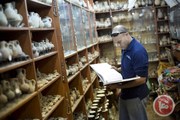
The Egyptian Ministry of Antiquities is preparing legal procedures against an online Israeli antique store after it put up for sale a historical Egyptian painting allegedly confiscated by former Israeli Defense Minister Moshe Dayan, the Ministry said on Saturday.
Dayan, who served as Israel’s Defense Minister in the 1960s and 1970s, was known for his passion for antiquities, and is believed to have illegally seized a large number of ancient artifacts while looting archaeological sites.
Shaaban Abd al-Jawwad, the ministry’s director of recovered antiquities, told reporters that the ministry was investigating documents related to the painting to find out how it came to be taken out of Egypt, and that it planned on taking all legal steps to halt the sale of the painting.
Abd al-Jawwad said that during the Israeli occupation of the Sinai Peninsula from 1967 to 1979, the Israeli army, led by archeologist Avner Goren, worked in the Hathor temple in Serabet al-Khadim, and “moved many artifacts from the temple to Tel Aviv.”
Only five artifacts from the temple have since been returned to Egypt, Abd al-Jawwad said.
Dayan, who served as Israel’s Defense Minister in the 1960s and 1970s, was known for his passion for antiquities, and is believed to have illegally seized a large number of ancient artifacts while looting archaeological sites.
Shaaban Abd al-Jawwad, the ministry’s director of recovered antiquities, told reporters that the ministry was investigating documents related to the painting to find out how it came to be taken out of Egypt, and that it planned on taking all legal steps to halt the sale of the painting.
Abd al-Jawwad said that during the Israeli occupation of the Sinai Peninsula from 1967 to 1979, the Israeli army, led by archeologist Avner Goren, worked in the Hathor temple in Serabet al-Khadim, and “moved many artifacts from the temple to Tel Aviv.”
Only five artifacts from the temple have since been returned to Egypt, Abd al-Jawwad said.

The Palestinian Health Ministry in Gaza Strip called Saturday on Egyptian Authorities to open Rafah border crossing and to allow thousands of patients to travel to receive medical treatment.
The Ministry pointed out in a statement issued Saturday that the Rafah crossing has been closed for 74 consecutive days, calling on the Egyptian authorities to open the crossing in both directions and to alleviate the suffering of Gaza’s people.
Thousands of patients are still waiting to complete their medical treatment abroad, the statement said, warning of the deteriorating humanitarian situation in Gaza due to the Israeli 10-year siege.
The Health Ministry underlined that Rafah crossing was opened only for three days since the beginning of 2016. 30,000 Palestinians are in urgent need to travel via Rafah crossing including four thousands patients, the Ministry continued.
The Rafah crossing, the sole gateway for Gaza to the outside world, has been closed since July 2013.
The Ministry pointed out in a statement issued Saturday that the Rafah crossing has been closed for 74 consecutive days, calling on the Egyptian authorities to open the crossing in both directions and to alleviate the suffering of Gaza’s people.
Thousands of patients are still waiting to complete their medical treatment abroad, the statement said, warning of the deteriorating humanitarian situation in Gaza due to the Israeli 10-year siege.
The Health Ministry underlined that Rafah crossing was opened only for three days since the beginning of 2016. 30,000 Palestinians are in urgent need to travel via Rafah crossing including four thousands patients, the Ministry continued.
The Rafah crossing, the sole gateway for Gaza to the outside world, has been closed since July 2013.
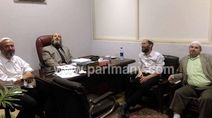
High ranking Salafi Islamist leader Jiah a-Shimi is under fire from his party in Egypt after meeting with a Jewish interfaith delegation. A-Shimi: 'goal of the meeting was to show the tolerance of the Islamic religion'
A delegation of Jews met with Salafi leader Dr. Jiah a-Shimi in the Egyptian town of Fayoum last month in a meeting which caused uproar amongst the Egyptian Salafi movement.
Dr. Omar Salem, an Egyptian-American religious scholar invited three Jewish scholars to Egypt as part of efforts to hold interfaith dialogue. The three were Rabbi Ya'akov Nagen from Otniel, orthodox peace activist Rivka Abramson, and Jewish religious scholar Professor Yosef Ringel.
Dr. Jiah a-Shimi is also a high ranking official in the Egyptian Salafist a-Noor political party and a former parliamentarian.
Egyptian media called the meeting "a meeting with Jewish rabbis," and the pictures which Egyptian media obtained of the event caused protests against the party. The party is now conducting an internal investigation regarding the event.
"This attests to the double meaning in regards to relations with countries which threaten Egyptian and Arab national security," said Ahmed al-Bari from the el-Wafad party who strongly condemned the meeting and accused the Islamist party of hypocrisy.
There were also those within the Salafist movement who attacked al-Noor for holding the meeting. Salafi Preacher Mohammad al-Abasiri said that "this act isn't unusual for someone who shakes hands stained with the blood of Arabs and Muslims with untouchable Zionists. They even work together under orders in Syria and other Arab and Muslim countries."
The a-Noor party was quick to release a statement clarifying that their stance on the matter is that "the Zionist Entity which is plundering the Lands of the Palestinians and the Arabs, and which attacks the holy places of Islam."
According to them, "(the party) is against any form of normalization with this entity, and is against meeting with any person who represents or is connected to it."
At the same time, they noted that the meeting between the Salafi official and the Jewish delegation was academic, and not party affiliated, and that the Salafi official didn't know the identity of the Jewish rabbi before the meeting, and once he found out that the rabbi was Israeli, he immediately notified the relevant security authorities.
Fayoum University, to which the a-Shimi official is affiliated, also opened up an investigation into the issue.
Another high ranking official in the a-Noor party, Mohamad a-Taifi, was quoted in a Kuwaiti newspaper as saying "A-Shimi's individual behavior doesn't represent the Party. He will be investigated by a-Noor because he hurt the party, and because he caused the party great embarrassment."
A-Shimi for his part defended himself in an interview to a Kuwaiti newspaper, saying that the party requested his resignation and that he refused. He explained that the Jewish delegation received permission from the security services to enter the university while being escorted by one of the religious scholars, and if he had known their identities beforehand, he wouldn't have agreed to meet with them.
"I agreed to meet with them once I understood that they live in the US and that they have no connection to Israel. The goal of the meeting was to show the tolerance of the Islamic religion," a-Shimi said.
The A-Noor party rose to prominence after the Egyptian revolution. It held the second most seats in parliament after the elections which brought the Muslim Brotherhood into power following the fall of Hosni Mubarak. However, during the most recent elections under A-Sisi, they only retained 10 seats.
A delegation of Jews met with Salafi leader Dr. Jiah a-Shimi in the Egyptian town of Fayoum last month in a meeting which caused uproar amongst the Egyptian Salafi movement.
Dr. Omar Salem, an Egyptian-American religious scholar invited three Jewish scholars to Egypt as part of efforts to hold interfaith dialogue. The three were Rabbi Ya'akov Nagen from Otniel, orthodox peace activist Rivka Abramson, and Jewish religious scholar Professor Yosef Ringel.
Dr. Jiah a-Shimi is also a high ranking official in the Egyptian Salafist a-Noor political party and a former parliamentarian.
Egyptian media called the meeting "a meeting with Jewish rabbis," and the pictures which Egyptian media obtained of the event caused protests against the party. The party is now conducting an internal investigation regarding the event.
"This attests to the double meaning in regards to relations with countries which threaten Egyptian and Arab national security," said Ahmed al-Bari from the el-Wafad party who strongly condemned the meeting and accused the Islamist party of hypocrisy.
There were also those within the Salafist movement who attacked al-Noor for holding the meeting. Salafi Preacher Mohammad al-Abasiri said that "this act isn't unusual for someone who shakes hands stained with the blood of Arabs and Muslims with untouchable Zionists. They even work together under orders in Syria and other Arab and Muslim countries."
The a-Noor party was quick to release a statement clarifying that their stance on the matter is that "the Zionist Entity which is plundering the Lands of the Palestinians and the Arabs, and which attacks the holy places of Islam."
According to them, "(the party) is against any form of normalization with this entity, and is against meeting with any person who represents or is connected to it."
At the same time, they noted that the meeting between the Salafi official and the Jewish delegation was academic, and not party affiliated, and that the Salafi official didn't know the identity of the Jewish rabbi before the meeting, and once he found out that the rabbi was Israeli, he immediately notified the relevant security authorities.
Fayoum University, to which the a-Shimi official is affiliated, also opened up an investigation into the issue.
Another high ranking official in the a-Noor party, Mohamad a-Taifi, was quoted in a Kuwaiti newspaper as saying "A-Shimi's individual behavior doesn't represent the Party. He will be investigated by a-Noor because he hurt the party, and because he caused the party great embarrassment."
A-Shimi for his part defended himself in an interview to a Kuwaiti newspaper, saying that the party requested his resignation and that he refused. He explained that the Jewish delegation received permission from the security services to enter the university while being escorted by one of the religious scholars, and if he had known their identities beforehand, he wouldn't have agreed to meet with them.
"I agreed to meet with them once I understood that they live in the US and that they have no connection to Israel. The goal of the meeting was to show the tolerance of the Islamic religion," a-Shimi said.
The A-Noor party rose to prominence after the Egyptian revolution. It held the second most seats in parliament after the elections which brought the Muslim Brotherhood into power following the fall of Hosni Mubarak. However, during the most recent elections under A-Sisi, they only retained 10 seats.
29 apr 2016
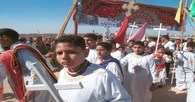
Thousands of Egyptian Copts traveled to the Occupied Palestinian territories on board Air Sinai flights, years after the Egyptian Church had banned travel to the territories occupied by Israel.
The Air Sinai Company said in press statements a total of 30 flights headed to the occupied Palestinian territories from April 21 to April 28.
It added that 5,678 Egyptian Copts were transferred to the occupied territories during Christian holidays. A security source at the Cairo Airport said on April 22 some 1,600 passengers traveled to Occupied Jerusalem on board flights by Air Sinai and the Jordanian Airlines.
The Israeli Haaretz newspaper on Thursday said around 6,000 Coptic pilgrims arrived in Tel Aviv to celebrate the Holy Saturday at the Holy Sepulcher in Occupied Jerusalem.
Haaretz said the number of Egyptian pilgrims to Occupied Jerusalem has seen a remarkable surge over recent years. Observers said such a “Coptic scramble” for the territories occupied by Israel dates back to a visit made by Pope of Alexandria Tawadros II in November 2015, in a move that sparked the rage of anti-Israel Egyptians.
Protests made at the time forced the Egyptian Church to affirm that the ban on Copts’ travel to Occupied Jerusalem was not lifted.
Earlier, on Saturday, two Israeli fighter jets intercepted an Air Sinai jetliner from Egypt, allegedly after the pilot failed to identify before entering Israeli airspace. The Israeli jets accompanied the Egyptian aircraft until it landed safely at Ben Gurion Airport.
The Air Sinai Company said in press statements a total of 30 flights headed to the occupied Palestinian territories from April 21 to April 28.
It added that 5,678 Egyptian Copts were transferred to the occupied territories during Christian holidays. A security source at the Cairo Airport said on April 22 some 1,600 passengers traveled to Occupied Jerusalem on board flights by Air Sinai and the Jordanian Airlines.
The Israeli Haaretz newspaper on Thursday said around 6,000 Coptic pilgrims arrived in Tel Aviv to celebrate the Holy Saturday at the Holy Sepulcher in Occupied Jerusalem.
Haaretz said the number of Egyptian pilgrims to Occupied Jerusalem has seen a remarkable surge over recent years. Observers said such a “Coptic scramble” for the territories occupied by Israel dates back to a visit made by Pope of Alexandria Tawadros II in November 2015, in a move that sparked the rage of anti-Israel Egyptians.
Protests made at the time forced the Egyptian Church to affirm that the ban on Copts’ travel to Occupied Jerusalem was not lifted.
Earlier, on Saturday, two Israeli fighter jets intercepted an Air Sinai jetliner from Egypt, allegedly after the pilot failed to identify before entering Israeli airspace. The Israeli jets accompanied the Egyptian aircraft until it landed safely at Ben Gurion Airport.
11 apr 2016
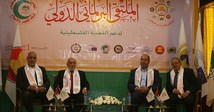
Palestinian, Arab and European MPs stressed on Sunday the importance of the Palestinian people’s right of self-determination and self-defense. During the Inter-Parliamentary Forum to support the Palestinian cause held in Gaza Strip, the MPs stressed the urgent need for the release of Palestinian MPs held illegally in Israeli jails and for the return of the exiled MPs.
The forum was organized by the Palestinian Legislative Council (PLC) in Gaza City with the participation of representatives of the Palestinian parliamentary blocs along with Arab and European MPs.
The MPs called for breaking Gaza siege as it causes a catastrophic humanitarian situation, calling on the Egyptian authorities to reopen Rafah crossing which has been closed for more than 500 days.
During the forum, the deputy head of Hamas’s political bureau MP Ismail Haneyya said that such forums stress that the Palestinian cause is a central issue. Haneyya expressed hope that the PLC will soon held a session with all its parliamentary blocs in Gaza and West Bank. Head of Hamas’s parliamentary bloc Khalil al-Hayya, for his part, stressed the need for activating the PLC’s parliamentary role.
He said that his group is keen to achieve the Palestinian national unity and reconciliation, calling for supporting the ongoing Jerusalem Intifada. In his turn, first deputy head of the PLC Dr. Ahmed Baher said that “the forum coincides with the anniversary of Deir Yassin massacre that represents evidence of the Israeli bloody mentality.”
Baher called on Turkish President Recep Tayyip Erdogan and the Saudi King Salman bin Abdul Aziz to take practical decisions in support of Palestinian cause. The leader in Fatah Movement Faisal Abu Shahla revealed during the event that there is an Israeli plan to deepen the gap between West Bank and Gaza and to continue the unfair siege on the Strip. He called for ending the internal division and to reform a new unity government prior the presidency and legislative elections.
He also called on the international community to stop its double-standard policy with Israel as a state above the law and to freeze the Israeli Knesset membership in the international parliament until the release of all Palestinian detained MPs. The second deputy head of the PLC Hassan Khreisheh detailed in his speech the Israeli violations against Palestinian people in West Bank.
There are more than half a million Israeli settlers living in 200 settlements in the West Bank and more and 600 military checkpoints set up throughout its towns and cities, he pointed out. The exiled Jerusalemite MP Ahmed Attoun called for activating Jerusalem and al-Aqsa Mosque issue at international forums and meetings, calling for supporting the Jerusalemite steadfastness.
Meanwhile, first deputy head of the Arab Parliament Samiya Ahmed said that contacts have been made to support the Palestinian cause and people. The Arab Parliament has made numerous contacts with regional and international parties to end the siege on Gaza and to achieve a decent life for the Palestinians, she underlined. Head of the World Forum for Islamist Parliamentarians Nasser al-Sana’a hailed, for his part, the Palestinian steadfastness and called for activating the Palestinian cause.
Deputy Chairman of the Tunisian Parliament Abdel Fattah Moro strongly condemned the continued siege on Gaza, saying that the Palestinian cause is a humanitarian issue. On the other hand, member of the European Parliament Jill Evans expressed in her letter to the forum her wish to visit Palestine and Gaza Strip in particular in the coming period. She pointed out that there is an increasing solidarity movement with the Palestinian cause within the European society.
For his part, member of European Parliament Bart Staes stressed that the EU is pressuring the Israeli occupation through the European Council of Foreign Ministers. Member of the Irish Parliament Richard Buebaras expressed his country’s total support for the Palestinian cause and people. Member of the British House of Commons Jenny Tong pointed out that the BDS movement against Israel has achieved a wide support in Britain.
The forum was organized by the Palestinian Legislative Council (PLC) in Gaza City with the participation of representatives of the Palestinian parliamentary blocs along with Arab and European MPs.
The MPs called for breaking Gaza siege as it causes a catastrophic humanitarian situation, calling on the Egyptian authorities to reopen Rafah crossing which has been closed for more than 500 days.
During the forum, the deputy head of Hamas’s political bureau MP Ismail Haneyya said that such forums stress that the Palestinian cause is a central issue. Haneyya expressed hope that the PLC will soon held a session with all its parliamentary blocs in Gaza and West Bank. Head of Hamas’s parliamentary bloc Khalil al-Hayya, for his part, stressed the need for activating the PLC’s parliamentary role.
He said that his group is keen to achieve the Palestinian national unity and reconciliation, calling for supporting the ongoing Jerusalem Intifada. In his turn, first deputy head of the PLC Dr. Ahmed Baher said that “the forum coincides with the anniversary of Deir Yassin massacre that represents evidence of the Israeli bloody mentality.”
Baher called on Turkish President Recep Tayyip Erdogan and the Saudi King Salman bin Abdul Aziz to take practical decisions in support of Palestinian cause. The leader in Fatah Movement Faisal Abu Shahla revealed during the event that there is an Israeli plan to deepen the gap between West Bank and Gaza and to continue the unfair siege on the Strip. He called for ending the internal division and to reform a new unity government prior the presidency and legislative elections.
He also called on the international community to stop its double-standard policy with Israel as a state above the law and to freeze the Israeli Knesset membership in the international parliament until the release of all Palestinian detained MPs. The second deputy head of the PLC Hassan Khreisheh detailed in his speech the Israeli violations against Palestinian people in West Bank.
There are more than half a million Israeli settlers living in 200 settlements in the West Bank and more and 600 military checkpoints set up throughout its towns and cities, he pointed out. The exiled Jerusalemite MP Ahmed Attoun called for activating Jerusalem and al-Aqsa Mosque issue at international forums and meetings, calling for supporting the Jerusalemite steadfastness.
Meanwhile, first deputy head of the Arab Parliament Samiya Ahmed said that contacts have been made to support the Palestinian cause and people. The Arab Parliament has made numerous contacts with regional and international parties to end the siege on Gaza and to achieve a decent life for the Palestinians, she underlined. Head of the World Forum for Islamist Parliamentarians Nasser al-Sana’a hailed, for his part, the Palestinian steadfastness and called for activating the Palestinian cause.
Deputy Chairman of the Tunisian Parliament Abdel Fattah Moro strongly condemned the continued siege on Gaza, saying that the Palestinian cause is a humanitarian issue. On the other hand, member of the European Parliament Jill Evans expressed in her letter to the forum her wish to visit Palestine and Gaza Strip in particular in the coming period. She pointed out that there is an increasing solidarity movement with the Palestinian cause within the European society.
For his part, member of European Parliament Bart Staes stressed that the EU is pressuring the Israeli occupation through the European Council of Foreign Ministers. Member of the Irish Parliament Richard Buebaras expressed his country’s total support for the Palestinian cause and people. Member of the British House of Commons Jenny Tong pointed out that the BDS movement against Israel has achieved a wide support in Britain.
2 apr 2016
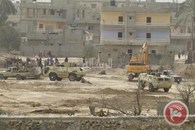
Egyptian forces shot and killed four smugglers Saturday in the Egyptian territory south of the Rafah crossing between Egypt and the Gaza Strip, Egyptian security sources said.
The sources, who wish to remain unnamed, told Ma'an that border guard officers exchanged gunfire with a group of smugglers trying to access an opening of a tunnel in the area of al-Duhniyya about one kilometer south of the Rafah crossing.
Border guard officers noticed “suspicious movement,” and when they arrive to assess the movement, smugglers opened fire on them from a hole in the ground that appeared to be a smuggling tunnel, the sources added.
The officers returned fire and killed four of the alleged smugglers while two others managed to escape back inside the tunnel after they had been shot and injured.
The source said the slain could not be identified.
Egyptian army engineers later arrived to the site and blew up the opening to the tunnel.
Until the July 2013 ouster of democratically-elected Egyptian president Mohamed Morsi, tunnels connecting the Gaza Strip to Egypt provided a vital lifeline for the territory amidst the otherwise crippling Israeli blockade, which has been in place since 2007.
Since the Egyptian President Abdel-Fattah al-Sisi came to power, however, Egypt has strictly enforced the blockade and targeted the tunnels.
Human Rights Watch last year slammed Egypt's military for its campaign against the tunnels, during which the group said some 3,200 families had been evicted from their homes near the border and hundreds of acres of farmland destroyed.
The group said Egypt had failed to provide adequate proof that insurgents were receiving support from the Gaza Strip.
The UN reported in February that only a few tunnels remained partially operational between Egypt and the Gaza Strip.
The sources, who wish to remain unnamed, told Ma'an that border guard officers exchanged gunfire with a group of smugglers trying to access an opening of a tunnel in the area of al-Duhniyya about one kilometer south of the Rafah crossing.
Border guard officers noticed “suspicious movement,” and when they arrive to assess the movement, smugglers opened fire on them from a hole in the ground that appeared to be a smuggling tunnel, the sources added.
The officers returned fire and killed four of the alleged smugglers while two others managed to escape back inside the tunnel after they had been shot and injured.
The source said the slain could not be identified.
Egyptian army engineers later arrived to the site and blew up the opening to the tunnel.
Until the July 2013 ouster of democratically-elected Egyptian president Mohamed Morsi, tunnels connecting the Gaza Strip to Egypt provided a vital lifeline for the territory amidst the otherwise crippling Israeli blockade, which has been in place since 2007.
Since the Egyptian President Abdel-Fattah al-Sisi came to power, however, Egypt has strictly enforced the blockade and targeted the tunnels.
Human Rights Watch last year slammed Egypt's military for its campaign against the tunnels, during which the group said some 3,200 families had been evicted from their homes near the border and hundreds of acres of farmland destroyed.
The group said Egypt had failed to provide adequate proof that insurgents were receiving support from the Gaza Strip.
The UN reported in February that only a few tunnels remained partially operational between Egypt and the Gaza Strip.
1 apr 2016
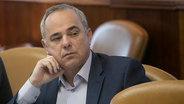
Energy Minister Steinitz meets with Minister Shoukry on sidelines of Nuclear Security Summit in Washington to discuss regional energy cooperation and the fight against terrorism.
Energy and Infrastructure Minister Yuval Steinitz met with Egyptian Foreign Minister Sameh Shoukry in Washington on Thursday in a rare meeting between senior ministers of both countries, the first in many years.
The meeting was held on the sidelines of the Nuclear Security Summit in the American capital and lasted an hour.
The two senior ministers discussed different regional issues, including the potential supply of Israeli gas to liquefaction and purification facilities in Egypt, and the international effort to prevent radioactive terrorism.
Steinitz and Shoukry's meeting was the result of US efforts to introduce Egypt into the regional energy treaty between Israel, Greece and Cyprus - something Israel is also interested in. The Americans also want to include Turkey in this treaty, which is viewed as an "energetic umbrella" strengthening the axis of moderate countries against Iran and ISIS.
There have been many indications of warming ties between Israel and Egypt recently. Israeli Foreign Ministry director-general Dore Gold went on an official visit to Cairo to reopen Israel's embassy there; Israeli citizen Ouda Tarabin, who was convicted of spying for Israel and spent 15 years in Egyptian prison, was released in October; a new Egyptian ambassador to Israel was appointed after three years without an ambassador; and, a month ago, Prime Minister Benjamin Netanyahu held a public meeting with the new Egyptian ambassador.
In addition, senior Israeli officials often visit Cairo, including Netanyahu's envoy Yitzhak Molcho and high-ranked IDF officers, while Egyptian President Abdel Fattah al-Sisi recently met with a delegation of Jewish leaders, headed by Netanyahu's associate Malcolm Hoenlein.
Israel also often authorizes Egypt to have an increased military presence in the Sinai to fight against ISIS and has been using its influence in Washington to convince public opinion and Congress to increase American military aid to Egypt.
Meanwhile, Turkish President Recep Tayyip Erdoğan said he will meet with Israeli officials in April as part of the effort to improve Israeli-Turkish ties.
Erdoğan also noted the terror attack in Istanbul about two weeks ago, in which three Israeli tourists were murdered, "didn’t only target Israeli tourists."
Energy and Infrastructure Minister Yuval Steinitz met with Egyptian Foreign Minister Sameh Shoukry in Washington on Thursday in a rare meeting between senior ministers of both countries, the first in many years.
The meeting was held on the sidelines of the Nuclear Security Summit in the American capital and lasted an hour.
The two senior ministers discussed different regional issues, including the potential supply of Israeli gas to liquefaction and purification facilities in Egypt, and the international effort to prevent radioactive terrorism.
Steinitz and Shoukry's meeting was the result of US efforts to introduce Egypt into the regional energy treaty between Israel, Greece and Cyprus - something Israel is also interested in. The Americans also want to include Turkey in this treaty, which is viewed as an "energetic umbrella" strengthening the axis of moderate countries against Iran and ISIS.
There have been many indications of warming ties between Israel and Egypt recently. Israeli Foreign Ministry director-general Dore Gold went on an official visit to Cairo to reopen Israel's embassy there; Israeli citizen Ouda Tarabin, who was convicted of spying for Israel and spent 15 years in Egyptian prison, was released in October; a new Egyptian ambassador to Israel was appointed after three years without an ambassador; and, a month ago, Prime Minister Benjamin Netanyahu held a public meeting with the new Egyptian ambassador.
In addition, senior Israeli officials often visit Cairo, including Netanyahu's envoy Yitzhak Molcho and high-ranked IDF officers, while Egyptian President Abdel Fattah al-Sisi recently met with a delegation of Jewish leaders, headed by Netanyahu's associate Malcolm Hoenlein.
Israel also often authorizes Egypt to have an increased military presence in the Sinai to fight against ISIS and has been using its influence in Washington to convince public opinion and Congress to increase American military aid to Egypt.
Meanwhile, Turkish President Recep Tayyip Erdoğan said he will meet with Israeli officials in April as part of the effort to improve Israeli-Turkish ties.
Erdoğan also noted the terror attack in Istanbul about two weeks ago, in which three Israeli tourists were murdered, "didn’t only target Israeli tourists."
30 mar 2016
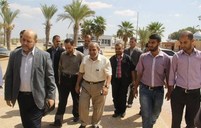
A senior delegation of the Hamas Movement returned to Gaza on Wednesday afternoon via the Rafah border crossing after concluding a tour of two Arab countries.
The delegation included political bureau members Khalil al-Hayya, Mahmoud al-Zahhar, Emad al-Alami, and Nizar Awadallah.
The delegates left Gaza on 12/3/2016 and held talks in Cairo with Egyptian intelligence officials before heading to Qatar then returned to Cairo last Sunday.
While in Doha, Qatar, the delegation met with a delegation of Fatah faction for a discussion over national reconciliation.
The delegation included political bureau members Khalil al-Hayya, Mahmoud al-Zahhar, Emad al-Alami, and Nizar Awadallah.
The delegates left Gaza on 12/3/2016 and held talks in Cairo with Egyptian intelligence officials before heading to Qatar then returned to Cairo last Sunday.
While in Doha, Qatar, the delegation met with a delegation of Fatah faction for a discussion over national reconciliation.
28 mar 2016
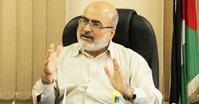
Hamas Movement said that its senior delegation to Egypt is continuing meetings with Egyptian officials over issues of mutual concern.
The leader in the Movement Ziad al-Zaza said that his group is following up talks with Egypt. "Talks are still ongoing. We look forward to positive results", he said.
The talks discussed regional and international issues of mutual concern, he explained, stressing his group’s interest in preserving the security and stability of Egypt similar to Palestinian national security.
A senior delegation representing Hamas Movement headed two weeks ago to Egypt then Qatar. It returned to Cairo on Sunday to complete those talks.
The leader in the Movement Ziad al-Zaza said that his group is following up talks with Egypt. "Talks are still ongoing. We look forward to positive results", he said.
The talks discussed regional and international issues of mutual concern, he explained, stressing his group’s interest in preserving the security and stability of Egypt similar to Palestinian national security.
A senior delegation representing Hamas Movement headed two weeks ago to Egypt then Qatar. It returned to Cairo on Sunday to complete those talks.
26 mar 2016
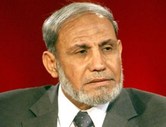
Dr. Mahmoud al-Zahhar, member of the political bureau of Hamas, said that the Egyptian intelligence did not ask the Hamas delegation, which visited Cairo last week, to help in the fight against armed elements in the Sinai.
Zahhar, in an interview on Al-Jazeera television on Friday evening, asserted that the visit of a delegation from Hamas Movement to Cairo was meant to improve relations with Egypt, stressing that Cairo is willing to open a new page in the relations with Hamas.
He explained that the delegation will return to Cairo again next Sunday to complete discussions with the Egyptian intelligence, describing the outcome of the first round of talks as "acceptable and positive." The Hamas leader said that the Egyptian intelligence called on Hamas Movement to address the Egyptian street with an information campaign to clarify the facts and refute the charges against it.
He explained that the Hamas delegation called on the Egyptian intelligence to open the Rafah crossing, and to develop trade between Egypt and Gaza. He said: "we were informed that the opening of Rafah crossing and the other issues are related to the clarification of facts to the Egyptian people."
He said: "If we open the door before trade exchange between Gaza and Egypt, the size of trade transaction will reach $3 billion in just one year." He explained that Egypt asked Hamas to apprehend terrorist elements, if found, inside the Gaza Strip. He stressed, however, that his Movement will not allow the existence of terrorists in Gaza.
Shifting to the internal Palestinian affairs, Zahhar said that his Movement had agreed on forming a national unity government in accordance with the past agreements, calling on Fatah movement to implement the Cairo agreement and to hold legislative and presidential elections. He pointed, in this regard, to the presence of a delegation from the Fatah movement in the Qatari capital, Doha to resume the reconciliation talks.
Masri: Israeli occupation our only enemy
Senior Hamas leader Mushir al-Masri called on Muslims to pool resources and heal all sectarian rifts in order to face up to the Israeli occupation.
Masri said, at the end of a rally held in northern Gaza to commemorate the 12th anniversary of Sheikh Ahmed Yassin’s assassination, the Palestinian cause is that of every Muslim in all corners of the earth. He reiterated Hamas’s readiness to cooperate with all Arab parties so as to boost bilateral bonds.
He said talks with Egyptian parties have been ongoing to prop up fraternity ties. “Our only enemy is the Israeli occupation. Hamas’s weapon will be held to Israel’s head only,” Masri added. “Palestine is indivisible. Palestinians are one and the same. We shall never forfeit a single inch of our native soil,” Masri emphasized.
“Occupied Jerusalem is the capital of our future independent state,” he said. “Our people will never have a moment’s rest until they return to their motherland from which they have been displaced.” According to Masri, armed resistance is Palestinians’ only path to liberation.
He also vowed that Hamas will do whatever it takes to release Palestinian prisoners in Israeli jails. “The Palestinian anti-occupation uprising will keep going until Palestinians’ dreams come true,” the Hamas leader concluded.
Zahhar, in an interview on Al-Jazeera television on Friday evening, asserted that the visit of a delegation from Hamas Movement to Cairo was meant to improve relations with Egypt, stressing that Cairo is willing to open a new page in the relations with Hamas.
He explained that the delegation will return to Cairo again next Sunday to complete discussions with the Egyptian intelligence, describing the outcome of the first round of talks as "acceptable and positive." The Hamas leader said that the Egyptian intelligence called on Hamas Movement to address the Egyptian street with an information campaign to clarify the facts and refute the charges against it.
He explained that the Hamas delegation called on the Egyptian intelligence to open the Rafah crossing, and to develop trade between Egypt and Gaza. He said: "we were informed that the opening of Rafah crossing and the other issues are related to the clarification of facts to the Egyptian people."
He said: "If we open the door before trade exchange between Gaza and Egypt, the size of trade transaction will reach $3 billion in just one year." He explained that Egypt asked Hamas to apprehend terrorist elements, if found, inside the Gaza Strip. He stressed, however, that his Movement will not allow the existence of terrorists in Gaza.
Shifting to the internal Palestinian affairs, Zahhar said that his Movement had agreed on forming a national unity government in accordance with the past agreements, calling on Fatah movement to implement the Cairo agreement and to hold legislative and presidential elections. He pointed, in this regard, to the presence of a delegation from the Fatah movement in the Qatari capital, Doha to resume the reconciliation talks.
Masri: Israeli occupation our only enemy
Senior Hamas leader Mushir al-Masri called on Muslims to pool resources and heal all sectarian rifts in order to face up to the Israeli occupation.
Masri said, at the end of a rally held in northern Gaza to commemorate the 12th anniversary of Sheikh Ahmed Yassin’s assassination, the Palestinian cause is that of every Muslim in all corners of the earth. He reiterated Hamas’s readiness to cooperate with all Arab parties so as to boost bilateral bonds.
He said talks with Egyptian parties have been ongoing to prop up fraternity ties. “Our only enemy is the Israeli occupation. Hamas’s weapon will be held to Israel’s head only,” Masri added. “Palestine is indivisible. Palestinians are one and the same. We shall never forfeit a single inch of our native soil,” Masri emphasized.
“Occupied Jerusalem is the capital of our future independent state,” he said. “Our people will never have a moment’s rest until they return to their motherland from which they have been displaced.” According to Masri, armed resistance is Palestinians’ only path to liberation.
He also vowed that Hamas will do whatever it takes to release Palestinian prisoners in Israeli jails. “The Palestinian anti-occupation uprising will keep going until Palestinians’ dreams come true,” the Hamas leader concluded.
25 mar 2016
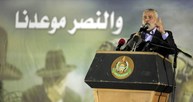
Deputy Head of Hamas’s political bureau Ismail Haneyya on Thursday evening described the talks in Cairo, between a senior Hamas delegation and Egyptian intelligence officials, as promising, saying that they covered three files mainly alleviating the suffering of Gaza people.
During "Our Revolution is for Jerusalem" festival, Haneyya revealed that the Cairo talks dealt with three files mainly alleviating the suffering of the people of Gaza, the Palestinian cause, and strengthening ties with Egypt. The talks with our brothers in Egypt were a promising development, he said.
He stressed that his Movement works at “securing the strategic depth with our Arab brothers in order to support the ongoing Jerusalem Intifada.” Hamas, he said, is a national liberation movement with an Islamic frame. Its weapons are only directed towards the Israeli occupation. The main aim behind Cairo talks is to provide support for our cause and people, Haneyya stressed. “Jerusalem is on our political, security and military top priorities and Gaza will always be a strategic depth for Palestine and resistance.”
The senior Hamas leader said that Jerusalem Intifada has entered its third stage characterized with armed confrontations. “It has exceeded all political and security coordination attempts to foil it.”
The Jerusalem Intifada’s strategic aim is to eliminate the Israeli occupation from Jerusalem and West Bank, according to his statements. “Achieving the Intifada’s aims needs restoring national unity based on the resistance option.” He stressed his Movement's total support for national reconciliation, pointing out that talks are being held in Doha and Gaza to implement what was agreed upon.
On the other hand, Haneyya phoned on Thursday the Saudi Islamic preacher Sheikh Ayed Al-Qarni to congratulate him on his safety from the shooting attack he was subjected to in the Philippines two weeks ago.
Haneyya had also phoned a number of Palestinian martyrs’ families in the West Bank whose sons were shot and killed by Israeli gunfire during Jerusalem Intifada. During the phone calls, Haneyya offered condolences to the martyrs’ families.
During "Our Revolution is for Jerusalem" festival, Haneyya revealed that the Cairo talks dealt with three files mainly alleviating the suffering of the people of Gaza, the Palestinian cause, and strengthening ties with Egypt. The talks with our brothers in Egypt were a promising development, he said.
He stressed that his Movement works at “securing the strategic depth with our Arab brothers in order to support the ongoing Jerusalem Intifada.” Hamas, he said, is a national liberation movement with an Islamic frame. Its weapons are only directed towards the Israeli occupation. The main aim behind Cairo talks is to provide support for our cause and people, Haneyya stressed. “Jerusalem is on our political, security and military top priorities and Gaza will always be a strategic depth for Palestine and resistance.”
The senior Hamas leader said that Jerusalem Intifada has entered its third stage characterized with armed confrontations. “It has exceeded all political and security coordination attempts to foil it.”
The Jerusalem Intifada’s strategic aim is to eliminate the Israeli occupation from Jerusalem and West Bank, according to his statements. “Achieving the Intifada’s aims needs restoring national unity based on the resistance option.” He stressed his Movement's total support for national reconciliation, pointing out that talks are being held in Doha and Gaza to implement what was agreed upon.
On the other hand, Haneyya phoned on Thursday the Saudi Islamic preacher Sheikh Ayed Al-Qarni to congratulate him on his safety from the shooting attack he was subjected to in the Philippines two weeks ago.
Haneyya had also phoned a number of Palestinian martyrs’ families in the West Bank whose sons were shot and killed by Israeli gunfire during Jerusalem Intifada. During the phone calls, Haneyya offered condolences to the martyrs’ families.
